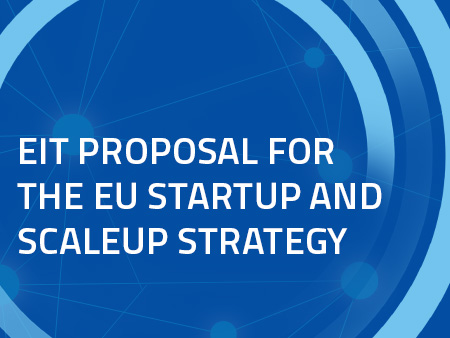EIT Governing Board Calls for Bold Action to Strengthen Europe’s Startup and Scaleup Ecosystem

The EIT is committed to shaping a dynamic and inclusive innovation ecosystem across the EU. Drawing on the Institute’s decade-long experience driving entrepreneurship and innovation, it is calling for ambitious reform to unlock the full potential of Europe’s startups.
This call to action is laid out in the EIT’s Contribution to the EU Startup and Scaleup Strategy, which outlines pressing challenges and recommendations for a stronger, more competitive Europe. The message is clear: we need bold, targeted and integrated reforms to elevate Europe from fragmented efforts to a world-leading startup ecosystem.
Moving from Fragmentation to Integration
The EIT identifies several structural barriers that limit startup and scaleup growth. Among these are fragmented access to capital, particularly in early stages and underrepresented regions; regulatory complexity and bureaucratic burdens that slow down innovation; and limited access to markets and industrial customers. Skills shortages—especially in deep tech and entrepreneurial expertise—further weaken the ecosystem. Gender disparities in startup funding and leadership persist, while support for intellectual property (IP) strategy and commercialisation remains insufficient. Finally, innovation support structures across Europe are often fragmented, creating duplication and inefficiencies that hinder progress.
Recommendations for a Future-Focused EU Startup Strategy
To address these systemic challenges, the EIT proposes a set of actions:
- Increase access to capital for early-stage startups through the creation of an EU Kickstarter Scheme and the expansion of the EIT Jumpstarter programme. The evolution of the Regional Innovation Scheme into a European Regional Innovation Booster will support emerging innovation ecosystems across the continent.
- Streamline regulatory frameworks by developing regulatory sandboxes where startups can test innovations in a controlled environment, supported by EIT KICs as sector-specific facilitators.
- Improve market access by strengthening the role of EIT KICs as innovation hubs. This would enable deeper integration between startups and industry, foster commercial partnerships and investment, and support mergers and acquisitions.
- Address skills gaps and talent shortages by consolidating the EIT’s education and training programmes under the EIT Innovation Campus. This will provide coordinated support from secondary education to adult learning and promote venture building through academic institutions.
- Close the gender gap in startup investment by scaling up initiatives such as EIT SUPERNOVAS, which supports women entrepreneurs and investors. These programmes aim to ensure equitable access to funding, expertise and networks.
- Enhance intellectual property expertise by creating a comprehensive IP support system in partnership with the European Union Intellectual Property Office (EUIPO) and the European Patent Office (EPO). This will help startups protect and commercialise their innovations more effectively.
- Create an integrated EU innovation funnel by aligning idea generation, startup development and scaleup funding. A coordinated framework linking European research, innovation and investment programmes—from idea to market—will help startups navigate and succeed across all stages.
Conclusion: From Recommendations to Results
The EIT Governing Board underscores the urgency of moving beyond isolated efforts towards coordinated, high-impact solutions. With its pan-European reach, sector-specific expertise and proven innovation model, the EIT stands ready to play a central role in implementing the EU Startup and Scaleup Strategy.


 Share this page
Share this page


